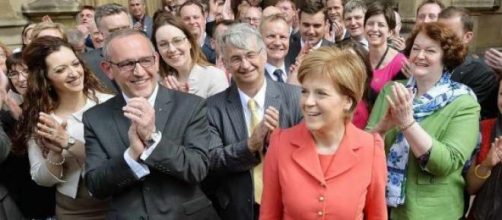The Scottish First Minister Nicola Sturgeon believes that the recommendations for devolution to Scotland drafted by the Smith Commission, following the independence referendum don't go "far enough". She only had the opportunity to speak "briefly" with re-elected Prime-Minister David Cameron but his "starting point seemed to be to implement the Smith Commission proposals", which, in light of her party's landslide victory in Scotland, need to be reconsidered.
The Scottish Nationalists are now the 3rd largest party in Westminster, winning 56 of the 59 Scottish seats, and Ms.
Sturgeon plans to hold further face-to-face talks with the Prime-Minister, as soon as possible. She told the BBC that the SNP will argue for "priority devolution of powers over business taxes, the minimum wage, employment and welfare, because these are levers needed to grow our economy, get people into work and lifting people out of poverty".
The Prime-Minister will be facing pressure, including from inside his own party, to deliver on further devolution to Scotland. The Conservative peer Lord Forsyth claimed Mr. Cameron should conceded that Scotland had undergone a "revolution" and respond accordingly by drafting a White Paper on the SNP's demands for full fiscal autonomy. The former Labour Chancellor Alistair Darling admitted that the Smith Commission proposals were "completely overtaken by events" and went as far as to propose a "federal solution" involving an even distribution of powers to Scotland, England, Wales and Northern Ireland.
During the weekend, the Prime-Minister David Cameron ruled out the possibility of another independence referendum in Scotland, claiming that even the SNP was not pushing for one. Ms. Sturgeon responded by saying that he has no right to make such claims since the decision will depend on what "people in Scotland want".
The Scottish First Minister also believes that her party is now providing the main opposition to the Conservative government in Westminster and is already reportedly courting libertarian Tory backbenchers to block important Conservative election pledges such as the introduction of the Snoopers' Chart or the repeal of the Human Rights Act.

